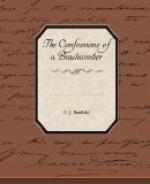“With that
Fixed arithmic of the universe,
Which meteth good for good, ill for ill,
Measure for measure.”
There may be a sort of satisfaction in the reflection, that for, perhaps, every insectivorous bird wantonly killed, some proportion of its weight in silver has to be paid indirectly by the country. But the satisfaction is of no avail to the dead bird nor to the species, unless the taxpayer feels the smart and becomes indignant. We want to save the lives of the birds, and the silver, then to moralise; not kill the bird and be compelled to spend the silver in destroying insects that the bird would have delighted to consume, and moralise upon the destructiveness of some hitherto insignificant bug or beetle, which has suddenly developed into a national calamity.
So it was resolved, as other phases of island life matured, that one of the first ordinances to be proclaimed would be that forbidding interference with birds. That ordinance prevails. Our sea-girt hermitage is a sanctuary for all manner of birds, save those of murderous and cannibalistic instincts. We give all a hearty welcome and make friends of them if possible. During the eight years of our occupancy many shy creatures have become quite bold and familiar; though I am fain to admit, with disappointment, that but slight increases in the species represented have been noticed. Four strange species of terns, which are wont to lay on the bare reef patches of the Barrier, now visit Purtaboi regularly every season, depositing their eggs among those of two other species, which in spite of disturbance by the blacks, year after year refused to abandon the spot. Possibly the fact that a haven of refuge has been established has not been widely promulgated among our friends. Those who are with us or visit us have peace and security, and are for the most part friendly and trustful.
Man—the late-comer, the last work, the perfect form—is not always kindly disposed towards the lower orders, though the dominion he exercises over them is absolute. Were not the beasts of the field, the birds of the air, the very fish of the sea, given over to his arbitrary authority? Here the interest in birds is mainly protective. The printed law of the land says in ponderous paragraphs all duly numbered and subdivided, that it is unlawful to kill many Queensland birds; and the pains and penalties for disregard thereof, are they not set out in terrifying array? But who cares? Take, for an example, the lovely Gouldian finch. The law makes it an offence to kill the birds, or to take their eggs, or to have them in possession dead or alive. Yet trappers go out into the habitation of the bird and snare them by the thousand. Fifty thousand pairs have been sent away in a single season. Not one tenth of those which twitter so faintly and yet so sweetly to their tiny loves of their own land and their erstwhile freedom, ever live to be gloated over, because of their fatal gift of beauty, in London or on the Continent.




